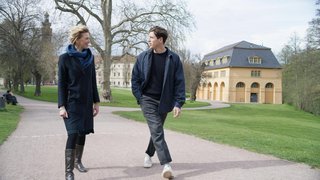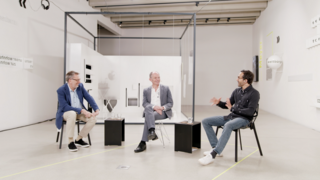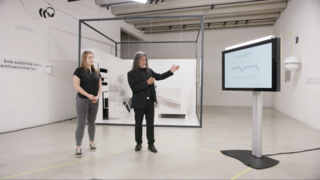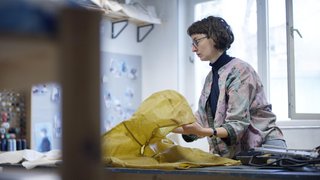Visions for a more sustainable life!
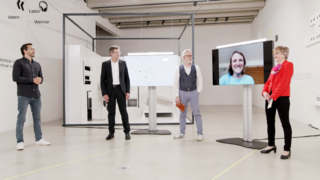
«How do we want to live?» This question was the focus of the first ideas laboratory in Weimar in May 2021. How can a better, more beautiful and more inclusive life become possible in times of climate change and the corona pandemic? The organizers were the Klassik Stiftung Weimar, the Bauhaus-Universität Weimar and the Thuringian Ministry for Infrastructure and Agriculture.
The digital conference not only looked at the challenges, but also set signs of hope with numerous ideas and projects that a more sustainable, inclusive life is possible. On Europe Day on May 9, 2021, various experts provided inspiration: In the 21 square meter studio in the Bauhaus Museum in Weimar, architect Van Bo Le-Mentzel showed how little space can be used cleverly. Materials expert Felix Heisel from Cornell University's "Circular Construction Lab" and architect Dirk Hebe digitally connected to the ideas laboratory and showed how the city can become a resource for "urban mining". The climate researcher Hans Joachim Schellnhuber and the sociologist Armin Nassehi provided further impetus. At the end, Benjamin-Immanuel Hoff, Thuringian Minister for Infrastructure and Agriculture, President of the Foundation Ulrike Lorenz and the then President of the Bauhaus-Universität Weimar Winfried Speitkamp and Ruth Reichstein of the EU Commission spoke about "The ideas laboratory as an incubator, room opener and bridge builder".
Two workshop days followed on May 13th and 14th. The »We – in the city of the future« workshop focused on the central question »How do we want to live?«. Sustainable food production in the city and the ecological transformation of public space were just two topics that Anton Brokow-Loga, Anne-Kathrin Kuhlemann and Anna Paulina Graf from the Bauhaus University Weimar discussed with all interested donors.
The workshop “Country Life for Future”, on the other hand, brought together local projects that explored the potential of rural areas in ecological change and the European context.
The workshop with Thomas Lützkendorf, expert for sustainable building at the Karlsruhe Institute of Technology, the architect of the "Green Laboratory" in the Park on the Ilm, Hannes Schmidt, and Katja Fischer from the International Building Exhibition (IBA) Thuringia was dedicated to "green building".
The workshop "May the Bauhaus be called?" finally asked whether the title of the EU initiative "New European Bauhaus" was appropriate and where the association with the classic Bauhaus lagged. Annemarie Jaeggi, Director of the Bauhaus Archive Berlin, Regina Bittner from the Bauhaus Dessau Foundation and Winfried Speitkamp, then President, will then discuss where the Bauhaus can continue to inspire in the future, what needs an “update” or should remain in the 20th century the Bauhaus-Universität Weimar.
The digital conference took place in cooperation with the National Academy of Sciences Leopoldina, the International Building Exhibition (IBA) Thuringia, the Bauhaus Cooperation and the initiative Germany - Land of Ideas. It was funded by the Free State of Thuringia, the Federal Government Commissioner for Culture and the Media, the Thuringia Foundation for Technology, Innovation and Research, and the Jena-Thuringia Climate Protection Foundation.
Workshops
Workshop 1 The Anthropocene - We as a force of natureas Anthropozän
Workshop 2 How sustainable is green building?
Workshop 3 Country life for Future
Workshop 4 Material of the future must be material with a future!
Workshop 5 Nutrition, neighborhood, mobility. And you? ...
Workshop 6 Mobility SPEEDdating
Workshop 7 How do I make an institution more climate neutral?
Workshop 8 Can that actually be called Bauhaus?
Workshop 9 Locomotion
Here are some of the video posts (only in german):
»Beton & CO2« Marko Seidemann, doctoral student at the professorship for building materials, on his research on concrete and CO2 recycling.
»Lehmtafelbauweise« Larissa Daube, research associate at the Professorship of Massivbau II, is developing a prefabricated clay construction for the first time that is load-bearing and at the same time insulates.
»Künstlerische Auseinandersetzung mit Ökologie« Paul Knopf, a student of fine arts and architecture, deals with questions of ecology both artistically and in architecture.
»Hudson Valley Ecologies« Till Hoffmann, research associate at the Professorship of Design and Housing, presents the teaching research project "Hudson Valley Ecologies". In cooperation with Columbia University, students have dealt with the landscape of the Hudson Valley in terms of infrastructure, water use, agriculture and housing.
»8 Hektar« Eight students of architecture and urban studies have come together as a collective for their theses. The starting point for everyone was the rural area of Thuringia.
»Textilwerkstatt« Katrin Steiger, artistic assistant at the Art and Social Space professorship, and Anne Marx, alumna of Visual Communication, are working together with textile designer Nadine Göpfert to reactivate the textiles department at the Bauhaus University in Weimar and to work with the material on an interdisciplinary basis.

